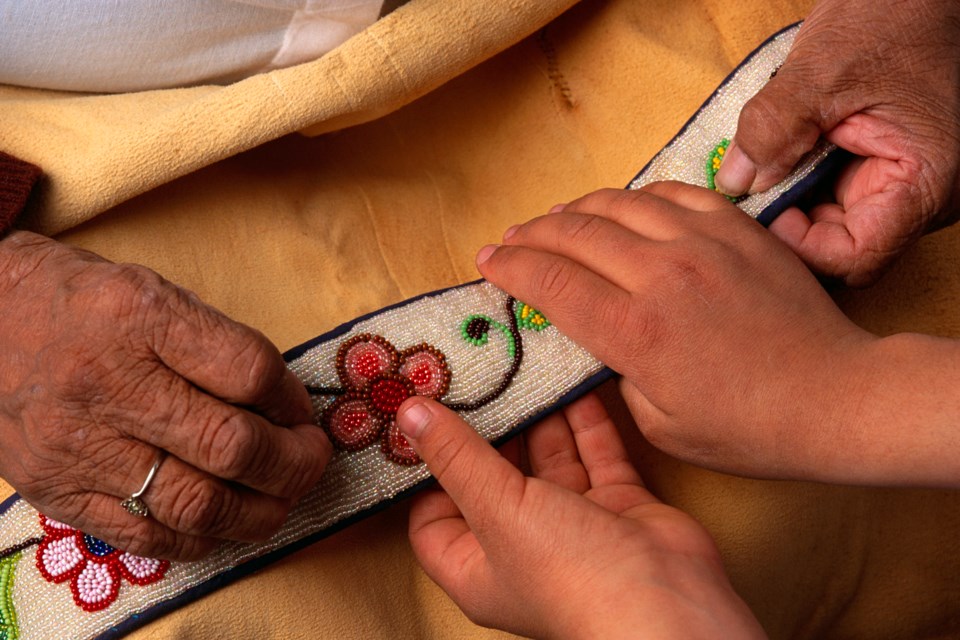Flin Flon schools are continuing on work as part of a provincial pilot project meant to encourage Indigenous teachings and knowledge in the classroom.
The Elders and Knowledge Keepers in Schools program is a provincial pilot project, operating under the provincial education ministry, designed to provide students and school staff with lessons and knowledge from Indigenous Elders. The Flin Flon School Division was picked as a pilot site for the project this year, along with 10 other school districts throughout Manitoba - 33 schools in all are taking part in the project, which began in January.
“Thirty-three pilot schools will work with Elders and knowledge keepers to learn Indigenous worldviews building community and fostering successful impacts for teachers, students, families and communities,” reads the project brief on the provincial website.
While 33 schools are involved, how exactly the project will look in each community and school has no clear blueprint - that is where local teachers, school staff, administrators and the Elders come in. All four Flin Flon schools have taken part in the program in some way, with each having done it differently.
“We don't want to treat any of our Elders and knowledge keepers like guest speakers. They're teachers and this is the opportunity for them to come in and teach some of their oral history,” said Miranda Bowman, who’s been tasked with implementing the plan at Ruth Betts Community School. Bowman, the school’s principal, said that discussions have covered history, nutrition, art and culture and other fields and that three teachers have been developing lesson plans for students based on the plan - programming for early years, middle years and junior high students.
“They're doing their lessons and then they're going to tweak them and give them to the other teachers in their grade groups - that way, they get started in some sort of continuous inclusion. It was a great opportunity.”
At Ruth Betts, the program included an opening ceremony earlier this year and has included several in-class events since January, with both teachers and Elders planning together.
“We're just trying to have Elders and knowledge keepers guide the process the whole way. Our teachers have some collaboration time and some release time,” Bowman said.
“What if we were doing star stories every year in the classroom, or water teachings or singing or the importance of hoops and using that in math - you could use these in almost anything.”
Things aren’t much different at Hapnot Collegiate, where other lessons have been taught and learned. That’s even included events this week, where the school held a screening for students and staff of the 2021 film Night Raiders. The movie, a Canadian-made production with a mostly Indigenous cast, is a science-fiction film that uses allegory to describe modern Indigenous issues, as well as the former residential school system and its long-lasting effects.
“There's some really interesting themes in it about Indigenous futurism, dystopic fiction and how things from the past can kind of come around to the future again,” said Kim Jones, one of the teachers involved with the project at Hapnot Collegiate.
“That's kind of one of the things that we've been working on, celebrating Indigenous art and Indigenous film.”
“We’re going to have an assembly, basically. We will have guests joining us and we’ll have a panel discussion, moderated by a teacher,” said Hapnot Collegiate principal Steve Lytwyn.
“We’ll have guests and students on the panel and as an old ELA teacher, I’d call it almost like a fishbowl exercise. They’ll have the moderator asking questions and they will respond.”
At Hapnot, another event is planned for June, not long before National Indigenous People’s Day, but plans are still tentative.
The project has meant a learning process for school staff, as well as students.
“I think personally, the first phase for me has been looking within and having that internal reflection - asking yourself what do we want to achieve, how do we get there, how are we most sensitive to everybody’s needs and their own personal stories? How do we move forward on reconciliation?” said Lytwyn.
“I think being aware of that and trying to be supportive is good, but I don’t have all the answers. I can only speak from my own experiences and wanting to improve the situation. I would say we’re on the right track as a school and that every bit helps - we want to support.”
Jones, who teaches band at the school, said she is hoping to better incorporate Indigenous knowledge into her craft.
“Every few years in band, we do a project where we make traditional hand drums with Elder Margaret [Head-Steppan] - that wasn’t related to this, but it was a rason that I was interested in getting involved in this pilot program - to figure out how I can be a better facilitator,” she said.
“I think that we are doing better than we have in previous years, as far as getting more like Indigenous information about the past, but also trying to balance those stories and also have celebration of Indigenous art and culture and have a balance of stories - kind of having us get out of the way and let the story shine through, being as supportive as we can.”




